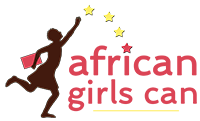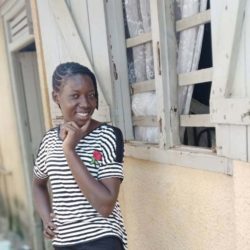 The odds against finding a job as a young person in Uganda are staggering. Uganda has the youngest population of any country in the world, with 77% of its people between the ages of 15 and 24. Uganda’s population is predicted to double between 2020 and 2060. The Uganda Bureau of Statistics found in 2021 that 41% of Ugandans between age 18 and 30, or 9.3 million people, are neither in school nor employed.
The odds against finding a job as a young person in Uganda are staggering. Uganda has the youngest population of any country in the world, with 77% of its people between the ages of 15 and 24. Uganda’s population is predicted to double between 2020 and 2060. The Uganda Bureau of Statistics found in 2021 that 41% of Ugandans between age 18 and 30, or 9.3 million people, are neither in school nor employed.
African Girls Can is a mere drop in this ocean, but our unwavering goal is to provide the young women in our program with an adequate education to lead independent, fulfilling lives and make a positive impact on their families and their communities. A secondary school education (whether four years or all six years) is an important start, but it is not enough. Additional skills and training are required to take the next step.
African Girls Can co-founder, Phoebe Mulinde, elaborates:
While secondary education lays a crucial foundation for personal and intellectual development, it often falls short in equipping students with the practical skills needed to thrive in the job market, especially in places like rural Uganda. Our curriculum of secondary education tends to emphasize theoretical knowledge rather than hands-on skills, leaving graduates ill-prepared to tackle real-world challenges in the workforce. There is a huge gap between education and employability where the job market demands a range of technical, vocational, and practical skills. Therefore, additional skilling beyond secondary education is imperative to bridge this gap and empower young women with the tools they need to secure meaningful employment and become self-sufficient.
Over the years, the initiative by African Girls Can to provide scholarships for girls in rural Uganda has evolved to recognize the importance of addressing this critical issue. While attaining a secondary education is a remarkable achievement that opens doors to further opportunities, the girls will most likely return to their villages only to be married off, which is one the most painful things to witness after struggling to put a girl through school to avoid child marriages. By offering scholarships for higher education and vocational training, the organization is enabling these young women to acquire practical skills aligned with market demands. This multi-faceted approach not only empowers the girls with employable skills but also instills in them a sense of confidence, independence, and agency. As these young women transition into the workforce with a combination of academic knowledge and practical expertise, they are better equipped to contribute to their communities, break the cycle of poverty, and serve as role models for future generations.
Recent St. Katherine A- Level graduate in biology, chemistry, and math, Akello Babra, shares her story and what she hopes to do next.
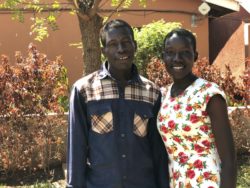
Babra’s Story
My name is Akello Babra. I am 21 years old. I come from the Otuke District in Northern Uganda. Growing up, it was just my mum and me. I lost my mum in 2016 when I was just 14 years old, but she continues to motivate and inspire me in many ways.
Her words have kept me moving in life.
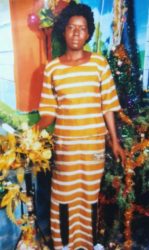
My mum’s name was Amongi Christin. She was such a joyous, welcoming, and hardworking lady, despite her physical weakness due to asthma. She raised money to pay for my primary school fees by baking and selling mandazi (a Ugandan bread snack), tomatoes, cabbage, and silverfish at the local trading center. I would help her to sell during the evening and weekends.
As an asthmatic, mum’s attacks would come as frequently as three times a day. Time and again, I had to call a nurse from the trading center. It became expensive because we had to pay a fee each time and the nurse also made us feel we were taking her away from her other patients. We took it upon ourselves to learn how to administer the steroid injections. I did not find it hard to learn to do this and, in fact, it’s how my interest in medicine began.
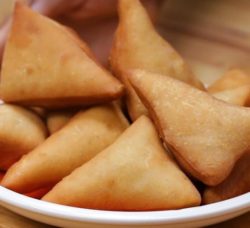
My favorite memory of my mum was the last Christmas we spent together in 2015. We went to a local football match. She decorated the house with bougainvillea flowers, prepared food, and told stories.
I told my mum about my dream of working in medicine. She said to be a good medical worker one must have a kind heart and sympathy for patients. She also said education would give me everything I hoped for in the future. As I left to go live with my uncle and start Okwang Secondary School, she told me to be disciplined, focus on my studies, and never forget to lift up or help others if God gave me the opportunity.
When I came back home from school at the end of that term, she was gone. Christin was just 33 years old. Her words have kept me moving in life. I can now stay anywhere and adjust to the situation around me.
I know if she was here now, she would be happy to see how far I have come with my education and that I am still focusing on my dream.
I wanted something better.

After my mum’s death, my uncle accepted me as a member of his family, but school fees were always a problem because he has his own biological children to take care of. I would report to school late and at times without enough scholastic materials or personal supplies. I can still recall one of the terms in Form Three when I went to school with nothing but a half bar of soap. A good friend will always stand by your side and my best friend Sharon helped me to complete the term since her parents were able to provide for her adequately. My friends kept comforting me while I encouraged myself and pretended to be fine. I put all my problems aside and concentrated on my studies because I wanted something better.
My determination paid off. When I sat for the (Uganda Certificate of Education/UCE) exams (after Form Four) in 2019, I emerged with the second highest score at my school. I shouted at the top of my voice and had tears of joy running down my cheeks when I saw my results. My friends, teachers (especially my math teacher), uncle, and other relatives were extremely happy about my achievement.
Despite my great performance, my hopes were dashed as there was no money at all for Advanced Level (last two years of high school). I did garden work with my grandmother back in the village, preparing the plot as we waited for the rainy season.
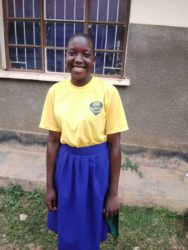
A family friend connected me to African Girls Can and I excitedly joined Form Five at St. Katherine a month after others had already started. St. Katherine is such a nice school with a cool environment for learning – its compound is full of trees and flowers. My heart was full of joy on the first day as the classroom was wonderful with new friends and inspirational words on the wall that caught my attention. It took me a short period to adjust to there being no boys. At my previous co-ed school, there was a lot of academic competition, and the boys were expected to come out on top and be the leaders. The boys belittled the girls, especially the smart girls. At St. Katherine, girls were expected to perform well and take on leadership.
COVID-19 interrupted smooth learning when schools closed. It affected me so much academically since we could not interact with our teachers face-to-face and subjects like biology and chemistry require practicals (i.e. labs). AGC provided a tablet for online study, but the internet was unreliable. Despite these challenges, I earned high marks in my science combination and graduated in 2022.
I am grateful to AGC for supporting me in my education. May God continue to bless AGC as they strive to touch and change the lives of many young girls in Uganda.
I have fought every step of the way to get an education and I do not want it to end here.
A healthy, happy community is my ambition.
I have been admitted to Kampala International University to pursue a Bachelor of Clinical Medicine and Community Health. I learned a lot by nursing my mother at a young age, and I wish to acquire professional knowledge in the medical field. I am most interested in internal medicine for adults, particularly the critical analysis of the patient’s illness to determine proper testing and treatment. I think learning to perform certain procedures in the operating theater will be the most challenging part of studying medicine.
I believe that if I complete this course, I will be able to serve the community within my reach regardless of their sex, age, tribe, religion, or race by doing whatever it takes to save a life. I love to see people around me living a happy life, free from sickness.
An Investment in Akello Babra
2,850,000 Ugandan Shillings per semester for 9 terms. This is the equivalent of about $750 per semester, or a total of $6,750.
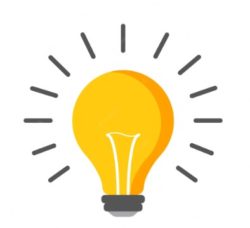 An idea! A group of 9 doctors, nurses, and/or public health professionals could band together and each contribute $750 to cover one semester of Babra’s medical education in Uganda.
An idea! A group of 9 doctors, nurses, and/or public health professionals could band together and each contribute $750 to cover one semester of Babra’s medical education in Uganda.
Invest in Babra by donating HERE. Thank you!
Read about another African Girls Can graduate’s dream to open a pharmacy.
